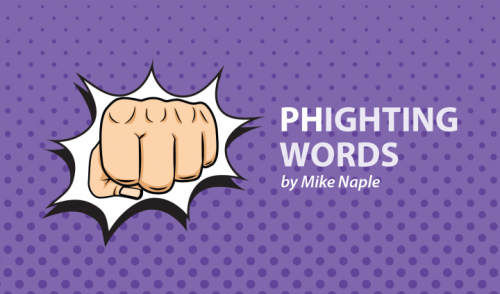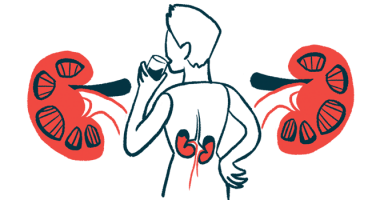Revisiting ‘PHighting Words,’ 5 Years After My Diagnosis

PHighting Words Mike Naple
“Where do you see yourself in five years?”
This is one of my least favorite questions during job interviews, and I hated it even more when I would catch myself lobbing it at prospective co-workers. Oddly enough, if somebody had asked me that question five years ago, I would’ve responded, “Well, hopefully, I’ll still be alive, and just maybe I will have made it back to Italy.”
As I pick up this column again after a long hiatus, I am reflecting on what it means to hit the five-year mark since receiving my pulmonary hypertension diagnosis in 2016. I am a little surprised to be here. I didn’t necessarily think I would be dead, although on a few nights, fear of a shortened life span brought me to tears. I’ve found that adjusting to life with a chronic illness comes with a heightened sense of uncertainty lurking around every corner.
One could argue that uncertainty is often baked into the diagnosis from the beginning, as pulmonary hypertension frequently is misdiagnosed. A delayed diagnosis can lead to the presence of more intense symptoms and a disease that has progressed by the time an accurate diagnosis is reached.
A doctor diagnosed me with asthma in 2015, perhaps because asthma was prevalent in my family. Maybe inhalers were the recommended treatment, based on the doctor’s best educated guess, and it was the quickest way to put the puzzle pieces together. But even inhalers, and eventually, in-home oxygen, couldn’t prevent the massive shortness of breath I experienced after walking half a block to catch the metro to work.
I previously wrote about bouts of high-altitude pulmonary edema from 2006 to 2012. One even included a Life Flight helicopter ride over the San Bernardino Mountains. Each episode entailed a multiday hospitalization, yet no one looked beyond the high altitude to see if something more was going on with my lungs and heart.
In between those episodes, I joined my family for a vacation in Italy. We traveled from Rome to Naples, and back again. While there was plenty of walking as we explored these cities on foot, along with lots of gelato, I didn’t think I was exerting myself more than I usually would, and certainly not like I was running.
However, something happened on the way home from the Coliseum: It became harder for me to walk, and I experienced more rapid bursts of shortness of breath. I made it through the rest of the trip, and once I returned home to California, those symptoms quickly subsided.
Five years later, after a call to urgent care from my Washington, D.C. apartment and a nearly two-week hospital stay, complete with transfer from one hospital to another, I would get my PH diagnosis and learn all about this rare disease without a cure.
It’s impossible to summarize the past five years in a single thought or feeling, and I’m not sure any amount of words would do it justice. I’m not ashamed to say that for much of that time I felt angry, and I outwardly expressed that anger unfairly to loved ones. I nearly broke down while describing to a work colleague the frustration I felt in recognizing how PH has begun to affect my ability to function and produce at a certain level.
I sought out therapy to help process the anger and uncertainty only to realize fear and anxiety are what I felt deep down, even though the diagnosis put a label on the struggles I had experienced.
My stubbornness has also shown itself to be a more dominant personal trait in my post-diagnosis life. I have always been stubborn, but living with a chronic illness feels like trying to fit a square peg into a round hole. Doctors say you’re supposed to adapt to a “new normal,” a square peg in a square hole. That’s just not how I’m programmed. It’s an understatement to describe my search for a new base level as a challenge. I’m working on it.
I had finally developed an exercise routine I could stick to when the pandemic turned life on its head. I spent most of 2020 quarantined, working from home and trying to process more uncertainty. Last year brought loss, isolation, discovery, pain, plenty of introspection, and a new understanding about what it means to me to be chronically ill and disabled. It also helped me realize I was ready to write again.
While the next five years remain a mystery, I am excited to revisit this column. To talk about life with PH, the challenges of defining both identities and boundaries within this space, and of course, healthcare and rare disease advocacy. I hope you’ll welcome me back!
***
Note: Pulmonary Hypertension News is strictly a news and information website about the disease. It does not provide medical advice, diagnosis, or treatment. This content is not intended to be a substitute for professional medical advice, diagnosis, or treatment. Always seek the advice of your physician or other qualified health provider with any questions you may have regarding a medical condition. Never disregard professional medical advice or delay in seeking it because of something you have read on this website. The opinions expressed in this column are not those of Pulmonary Hypertension News or its parent company, BioNews Services, and are intended to spark discussion about issues pertaining to pulmonary hypertension.








Comments
Lesley Patricia Randall
Thank you for your Article and how you feel.
For me I was diagnosed in 2015 March and spent the rest of the year in and out of hospital. The diagnosis was Severe Right Heart Failure and PAH. Also, had internal bleeding in my right leg.
Over the years before the diagnosis I found myself becoming out of breath easily, swelling of ankles, which were changing colour, could only walk a few steps, the Doctors Surgery was over the road and I made it to there holding on to a wall and my husband. Told asthma, bronchitis and more. The Doctor one day when visiting called an ambulance to send me direct to the hospital which was March 2015.
I was frightened, concerned and when receiving the diagnosis thought what will be in store for me and particularly my husband. I suffered with depression and bouts of anxiety. I have learnt to live with the new norm, but when COVID and lockdowns happened (I live in Mallorca, Spain (British), Spain had one of the hardest Lockdown's and the Balearic Island which Mallorca is the main island is still very strict with restrictions. However at the beginning of COVID my husband was rushed into hopital with Sepsis and again 5 months later he went into a Coma and again rushed into hospital (touch and go) with Bacterial Pnuemonia.
During his illness I was the one who cared for him including a bad bedsore on his bottom.
This brings back to me the worry for me and for him and we live on our own with five cats. I have been lucky so far that my progress with my Chronic Condition has been good, and hope that this remains so. See/Hear the Consultant again in July for me. The last time he telephoned me.
I am stressing at present as I have not had the Jab, my husband has had both.
Again, thanks for the article. Take care
Lesley
Sandra Guajardo
I enjoyed your article. I was diagnosed in May 2017 and I too kept thinking about the next 5 years. I read several times that the average life span for PAH was 5 years and that's all I could think about. This month, May, as what I like to refer to as my new birthday due to when I was diagnoses, I'm finally not thinking about the 5 year mark. My doctor's visit in April was very positive and I feel like I can finally start being optimistic.
Please continue to write!
Mary A McNamara
Welcome back! You are an excellent writer and voiced many of the fears, feelings, and frustrations I've endured since my diagnosis of PAH in 2012 (6 weeks after my Dad--my best friend, teacher & protector--died). I'm stubborn, too; it's both a blessing (and one reason I'm still alive against all odds) and a curse, I think.